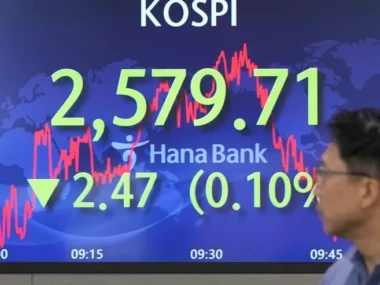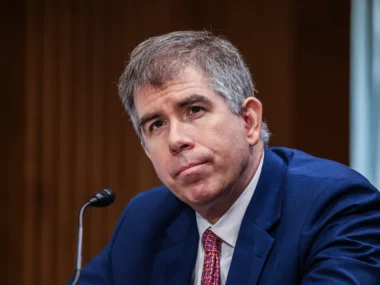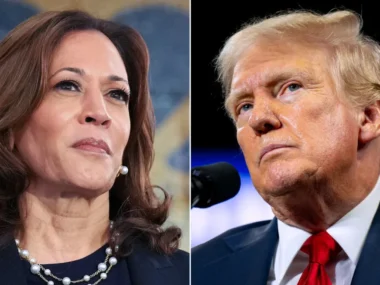The UK business secretary warns that US tariffs on UK steel would be harmful to both nations.
Jonathan Reynolds told the BBC that the UK and US share a “mutual interest” in securing an exemption from President Donald Trump’s proposed 25% import tax, expected to take effect in March.
He emphasized that the UK has a unique trading position and supplies specialized steel and aluminium products essential to the US, such as Sheffield-made Navy submarine casings. Imposing tariffs would increase costs for US taxpayers.
Reynolds’ remarks follow the UK government’s pledge of up to £2.5bn to support the domestic steel industry. While Trump has stated his tariffs will apply “without exceptions or exemptions,” Reynolds argued that including UK steel would be detrimental to both countries.
Speaking on Sunday with Laura Kuenssberg, he mentioned productive discussions with key figures in the Trump administration, including the US special envoy to the UK, who acknowledge the distinct UK-US trade relationship.
Reynolds expressed optimism about “constructive engagement” but acknowledged challenges, noting that the UK’s trade position differs from that of the EU or China.

The UK government has stated it will not immediately retaliate against Trump’s proposed steel tariffs.
UK Steel, representing the industry, warned that these tariffs would be a “devastating blow,” jeopardizing the sector’s £400m annual trade with the US.
Although the US accounts for only about 10% of UK steel exports, industry leaders fear the impact could extend beyond lost sales. If other countries redirect their steel—no longer exported to the US—into the UK market at lower prices, it could undercut domestic steelmakers.
Shadow business secretary Andrew Griffith criticized the government for remaining silent on the uncertainty facing the steel industry, arguing it should be actively engaging with the US, the UK’s closest trading partner.
On Sunday, the government launched a consultation on its Plan for Steel, aiming to tackle longstanding industry challenges, including the influx of cheap imports. The UK steel sector has struggled with significant job losses in recent years.
Tata Steel is transitioning to an electric arc furnace at its Port Talbot site in Wales, phasing out traditional steelmaking and cutting 2,800 jobs. Similarly, British Steel plans to replace blast furnaces in Scunthorpe with electric arc furnaces, putting 2,000 jobs at risk.
Asked about potential job losses in Scunthorpe, Reynolds acknowledged that workforce reductions would come with new technologies but suggested job growth could follow if domestic steel demand rises.
According to the Department for Business and Trade (DBT), the government’s plan will address longstanding obstacles by:
- Expanding steel production opportunities
- Promoting the use of UK-made steel in public infrastructure projects
- Enhancing scrap processing capabilities
- Investing in electric arc furnaces to reduce energy consumption and carbon emissions
The consultation will also explore electricity costs for steel companies to improve global competitiveness. However, no firm commitment has been made to lowering energy bills.
Griffiths expressed hope for a detailed plan but emphasized that reducing energy costs, which he described as a heavy burden on UK steel, must be a key part of the strategy.
The National Wealth Fund will provide financial support to the sector, partnering the government with the private sector and local authorities to fund infrastructure and other projects.
The government suggests this financial assistance could benefit regions with strong steel production histories, including Scotland and areas in England such as Scunthorpe, Lincolnshire, Rotherham, and Redcar.
The Department for Business and Trade (DBT) highlighted its swift action in backing projects like the Heathrow Airport expansion, which is expected to require 400,000 tonnes of steel.
The GMB union welcomed the government’s plan, calling it “desperately needed” funding after years of delays. Andy Prendergast, the union’s national secretary, stressed that domestic steelmaking capacity is critical for both economic stability and national security, particularly as global conditions become more volatile.
Gareth Stace, director-general of UK Steel, called the government’s commitment “vital and welcome,” adding that a strong strategy could help reverse the sector’s decline, especially as imports benefit from more favorable business conditions.
The consultation will inform a new “steel strategy,” set to launch in the spring.
The Liberal Democrats, however, have urged the government to prepare for potential retaliatory tariffs. Deputy leader Daisy Cooper warned that the UK steel industry is being left “dangerously exposed” to the damage Trump’s tariffs could cause.











